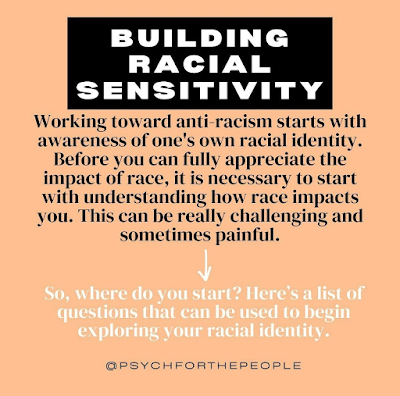This week we’d like to share a post from @psychforthepeople about how to build racial sensitivity. Working toward anti-racism starts with developing awareness of your own racial identity. Before you can fully appreciate how race impacts everyone in the U.S. today, it is necessary to start with understanding how race impacts you. This can be really challenging and, at times, painful.
So, where do you start? Here’s a list of questions that can be used to begin exploring your racial identity (Adapted from Laszloffy & Hard, 2000*):
How do I define myself racially?
When did I first become aware of race/skin color in general, and mine in particular?
What messages did I learn about race/skin color based on that first experience?
What direct and indirect messages did I receive about race/skin color from my family and friends throughout my childhood? My adulthood?
How did the messages that I received about race/skin color affect how I thought and felt about myself and others racially?
What benefits was I denied because of my race/skin color?
What is the racial makeup of the people I choose to date, befriend, and/or associate with?
Answering these questions can be a helpful starting point for folks who may feel lost in knowing how to begin exploring their racial identity. They are not simple questions to answer nor are the answers you come up with today going to remain the same throughout your lifetime. Importantly, continually exploring how your answers evolve and hearing others’ answers to these questions can begin to build your racial sensitivity (that is, your ability to empathize and relate to others’ racial experiences and to adjust and accommodate your behaviors accordingly). Racial sensitivity is an essential component of interacting with people from diverse backgrounds respectfully and compassionately. Being a person of color in the US necessitates developing a high level of racial sensitivity to learn to adapt to living within white supremacy culture. Being white in the U.S. means that racial sensitivity is not necessary because others were expected to adapt to white norms. Therefore, this list of questions can be particularly meaningful for white-identified people to engage with.
*Laszloffy, T. A., & Hardy, K. V. (2000). Uncommon strategies for a common problem: Addressing racism in family therapy. Family Process, 39(1), 35-50.
#nanooknation #universityofalaska #shcc #blacklivesmatter #antiracism #allyship #antiracist #psychology #mentalhealth #race #racism #activism #socialjustice #psychforthepeople




